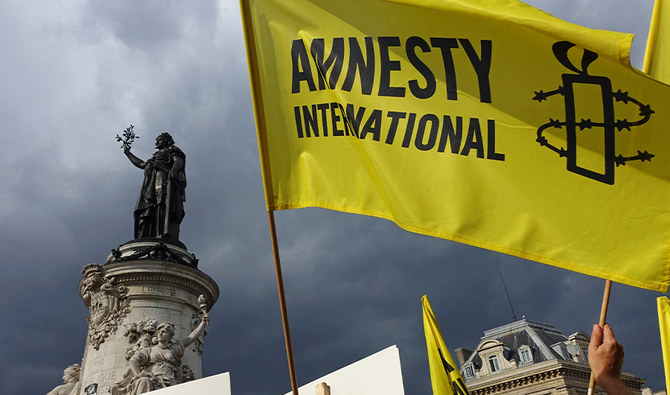SEOUL: South Korea’s new President Lee Jae-myung vowed Wednesday to restart dormant talks with North Korea and bolster a trilateral partnership with the US and Japan, as he laid out key policy goals for his single, five-year term.
Lee, who rose from childhood poverty to become South Korea’s leading liberal politician vowing to fight inequality and corruption, formally began his term earlier Wednesday, hours after winning a snap election that was triggered in April by the removal of then-President Yoon Suk Yeol over his ill-fated imposition of martial law late last year.
In his inaugural address at the National Assembly, Lee said that his government will deal with North Korean nuclear threats and its potential military aggressions with “strong deterrence” based on the solid South Korea-US military alliance. But he said he would “open a communication channel with North Korea and establish peace on the Korean Peninsula through talks and cooperation.”
He said he’ll pursue pragmatic diplomacy with neighboring countries and boost trilateral Seoul-Washington-Tokyo cooperation based on the robust South Korea-US alliance.
“Through pragmatic diplomacy based on national interests, we will turn the crisis posed by the major shift in global economic and security landscapes into an opportunity to maximize our national interests,” Lee said.
Security and economic challenges lie ahead
It was unclear whether Lee’s election would cause any major, immediate shift in South Korea’s foreign policy. Lee, previously accused by critics of tilting toward China and North Korea and away from the US and Japan, has recently repeatedly stressed South Korea’s alliance with the US as the foundation of its foreign policy and avoided any contentious remarks that would raise questions on his views on the US and Japan.
“We’ll have to now see if the pressures of office will cause Lee Jae-myung to govern from the center — at least when it comes to matters of national security and the alliance with the United States,” said Ankit Panda, an expert with the Carnegie Endowment for International Peace.
The toughest external challenges awaiting Lee are US President Donald Trump’s tariff policy and North Korea’s expanding military partnerships with Russia. But experts earlier said whoever becomes president can’t do much to secure major progress in South Korea’s favor on those issues.
During his inauguration speech, Lee didn’t directly mention trade issues with the US
US and Japan react
The US and Japan said they congratulated Lee’s election and expressed their commitments to developing three-way cooperation.
Japanese Prime Minister Shigeru Ishiba said he wants to hold summit talks with Lee “as early as possible,” saying he hopes to further promote bilateral ties, both public and commercial. The US State Department said that Seoul and Washington share “an ironclad commitment” to the alliance grounded in their mutual defense treaty, shared values and deep economic ties.
It’s unclear how North Korea would react to Lee’s speech, as it has shunned any talks with South Korea since 2019. North Korea in recent years has supplied weapons and troops to support Russia’s war against Ukraine, and South Korea, the US and their partners suspect Russia might in return transfer high-tech technologies to North Korea to help it perfect its nuclear weapons program.
Russia’s Tass news agency said Wednesday that one of President Vladimir Putin’s top security officials, Security Council Secretary Sergei Shoigu, has arrived in Pyongyang for a meeting with North Korean leader Kim Jong Un, in the latest sign of the countries’ alignment over Putin’s war in Ukraine.
Lee said revitalizing a slowing domestic economy would be his top priority and that his government would immediately launch an emergency task force to wage a “head-on battle” against the threats of recession. He also promised more aggressive government spending to help spur economic activity.
South Korea’s central bank last week cut its key interest rate and sharply lowered its growth outlook for 2025 to 0.8 percent, as it moved to counter Trump’s tariff hikes and weak domestic demand worsened by recent political turmoil.
South Korea still faces political divide
Lee also called for unity to address the country’s stark political divide deepened after Yoon’s martial law debacle, saying that he will “answer the people’s solemn call to let hope bloom over deep and painful wounds.” Lee still promised a thorough investigation into the circumstances surrounding Yoon’s martial law imposition, describing it as a “rebellion that seized people’s sovereignty with arms.”
Yoon and some of his top military and police officers already stand trial on high-stakes rebellion charges in connection with martial law. Lee’s push to bring those involved in Yoon’s martial law stunt accountable has subsequently caused speculations among his opponents that he would launch political revenge against Yoon associates and senior prosecutors whom he previously accused of fabricating evidence to initiate criminal charges against him.
Lee faces five trials on corruption and other allegations, but experts say those trials will likely stop during his term because the South Korean constitution gives a sitting president immunity from most criminal prosecutions.
Lee also reiterated his campaign vows to reduce inequality and pledged to address the imbalance between the greater Seoul capital area and less developed regions. He said that “the polarization fueled by inequality is now hindering further growth.”
Lee’s term began immediately without the usual two-month transition period after the National Election Commission formally confirmed his election victory.
























